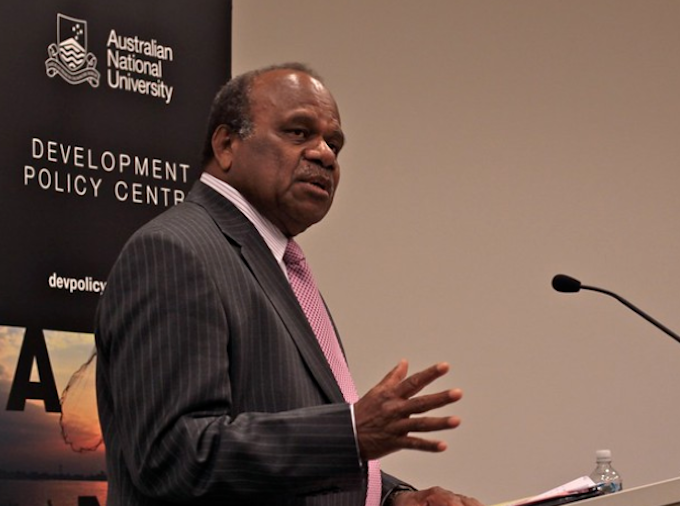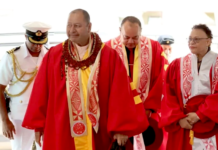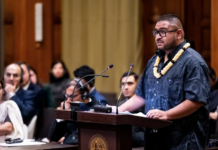
TRIBUTE: By Sir Charles Lepani
The devastating news of Sir Rabbie Namaliu’s untimely death has been difficult for us all to understand.
It has not been so long since Papua New Guinea mourned the passing of our founding father, Grand Chief Sir Michael Somare, and another great leader and Prime Minister — and someone whom I also regard as a close friend and brother — Sir Mekere Morauta.
Now the nation has been mourning again at the loss of another foundational leader.
I first came to know Rabbie for a brief period in 1967 and 1968 during our initial University of Papua New Guinea days, before I left to continue my studies in Australia.
But even for that brief period of two years, among the students in the pioneering cohort of UPNG students in 1966 and the second intake of students in 1967, I saw in Rabbie an emerging student activist asserting political leadership and influence in the life of the nascent institution of learning, not only preparing us to take on the challenges of decolonising Papua New Guinea, but demonstrating the makings of a leader in the political life of a future independent Papua New Guinea.
He was at the helm of history making. His was a voice that resonated well in our student debates, and I suspect he had a lot to do with the naming of our student news magazine, NILAIDAT, suspiciously a very Kuanua sounding word.
During the time of self-government leading to independence, several young men and women were working in the office of the then Chief Minister, Michael Somare. Key among them were Rabbie Namaliu, Meg Taylor, Nahau Rooney and Moi Avei. They were making their mark as political operatives advising the Chief Minister and his cohort of PANGU ministers, agitating for the colonial administration to be localised and for PNG to attain independence sooner rather than later, and, of course, attending to the serious business of setting policies for an independent PNG.
Decentralised government
To illustrate Rabbie’s overarching reach in shaping the history of our nation, I make mention of two significant points of reference. One was the work of the Constitutional Planning Committee spearheaded by John Momis and John Kaputin, who strongly advocated for a decentralised form of government to be an essential element in our constitution and in our development policies.
The other was the emerging economic crisis of inflation at the time, which shaped a key element of our evolving macro-economic management policy.
Rabbie had an invisible hand in guiding these two foundational elements of PNG’s progress to independence. As Principal Private Secretary to the Chief Minister, Rabbie was tasked with coordinating a weekly crisis management meeting.
As inflation loomed large, he brought in Mekere and Ross Garnaut to advise, which led to the promulgation of the hard kina policy. The younger generation will live to regret they were not around in those days to enjoy how the kina was valued higher than the US and Aussie dollars.
Then Rabbie was appointed Chair of the Public Service Commission, and among his lasting legacies was his leadership in decentralising the public service.
Our friendship with Rabbie was bound together by the history we shared. With Mekere Morauta in Finance to deal with how to fund decentralisation, Anthony (Tony) Siaguru heading Foreign Affairs, and me in the Planning Office, rumours of the now notorious “Gang of Four” began to circulate.
Among our “crimes”, our advocacy for a more rapid pace of decentralisation at the political level and within the public service, and, of course, tight control and management of fiscal policy.
Most introspective
Rabbie was the most introspective of the four of us when it came to his contribution to our efforts in public policy making for the future of an independent Papua New Guinea. As a historian, he infused context into our deliberations before we put policy options to the Somare-Chan post-independence government.
As Prime Minister, Sir Rabbie’s key achievements reflected his concerns about the social-political and environmental impacts of major resource projects. These included completing the protracted negotiations for the environment provisions of the Kutubu Petroleum Project and having these passed by Parliament, which then enabled the project to commence; his initiative in establishing the Development Forum, where joint venture partners, the state, provincial governments and landowners were brought together to reach agreement on key fiscal elements of equity distribution and tax; and the signing of the Porgera Agreement.
In our times together — whether we discussed matters of state or were just reminiscing over humorous moments in our interactions with our political masters and senior public service colleagues– Rabbie would, from time to time, let go of a loud raucous infectious laughter that would provoke a similar burst of laughter from Mekere, Tony and me, as if Rabbie were the lead singer and we chimed in for the chorus.
Those were truly moments of friendship that continue to resonate for me, especially since the passing of Tony in 2004, and then Mekere and now Rabbie.
I was deeply moved during the trip to Kokopo last week, on Sir Rabbie’s return to say his last farewell to his people, by the tributes from his people and our national leaders, and from many whose lives he has touched.
Loud and clear
They speak loud and clear of a life well lived and complete, a life of patient listening, of humility, generosity, untiring servitude and compassion. A life of leadership to emulate.
And I attest from the earliest days of our friendship, it was a life of passion and commitment for the good of this nation and its people.
Sir Rabbie represented Papua New Guinea at international fora, multilaterally and bilaterally, with great distinction. His life of dedication remains a living legacy for his people of East New Britain and for all Papua New Guineans.
Rabbie is one person whose legacy disproves old Bill Shakespeare, who in his play Julius Caesar gave to Marc Antony the words: “The evil that men do lives after them; The good is oft interred with their bones.”
Rabbie’s imprint on history is different. His good deeds will live on well and truly for many years to come, as long as we keep remembering our history as a nation.
Sir Charles Lepani, KBE, is a former public servant and diplomat from Papua New Guinea. He was the country’s High Commissioner to Australia from 2005 to 2017. This article appeared first on Devpolicy Blog, from the Development Policy Centre at the Australian National University.













































